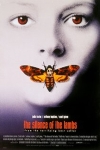
Directed by
Jonathan Demme
118 minutes
Rated MA
Reviewed by
Bernard Hemingway

The Silence Of The Lambs
This Oscar-chomper which took out Best Director, Picture, Adapted Screenplay (for Ted Tally based on the Thomas Harris best-seller), Actor and Actress, is a taut thriller-cum-horror that keeps the heart pounding. Although a genre film, and in this respect unremarkable, its greatest strength is the performances of Hopkins and Foster.
The former has entered the upper echelons of popular culture with his Chianti-sipping psychopath, Hannibal Lecter, whilst Foster in a role originally intended for Michell Pfeiffer, gives a superb performance as the star trainee of the FBI's Behavioural Science Unit, Clarice Starling, who is used as bait by her boss (Scott Glenn), in order to get help from Hannibal in catching a serial killer called Buffalo Bill (Ted Levine).
It is Foster’s mixture of youthful vulnerability and steely determination that gets us involved in what could have been a standard serial killer thriller. Despite this classification the film is much more about her than it is about Lecter or Bill. In the former role Hopkins is chillingly intimidating albeit more for what he implies than actually does. These two performers, the dynamic that develops between them and a ratcheted tension are the film’s principal assets. To what extent the latter is due to Demme and to what extent due to the editing by Craig McKay is debatable. It is, however, this tension which overcomes the improbability of what must be one of the most contrived escapes in cinema history and binds together what so often brings a movie down - a bifurcated narrative. Indeed given that the main storyline is about the tracking down of Buffalo Bill it is somewhat surprising that this part of the film is so unmemorable (Levine comes across as David Lee Roth on a bad trip). Tak Fujimoto’s cinematography is highly effective whilst Howard Shore’s atmospheric score also contribute to the success of the film.
For all that it is not easy to justify the film's iconic status. In 2011 it was selected by the Library of Congress for preservation in the National Film Registry as being "culturally, historically. or aesthetically significant". Really? Solid as it is as a genre film it's grisly and ghoulish stuff that will not be for the faint-hearted. I'd like to know what significance it has beyond that.
FYI: Demme’s film was followed by an inferior 2001 sequel, Hannibal, with Hopkins but with Ridley Scott as director and Julianne Moore replacing Foster. And, for completists, Michael Mann had first crack at the Hannibal character with 1986's Manhunter based on Harris’s Red Dragon with Brian Cox as Lecter (then called Lecktor) and Hopkins returning in a 2002 version thereof, Red Dragon.
Want something different?





